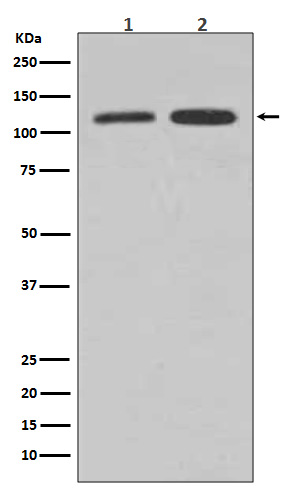Catalog No: CY5164 Reactivity: Human, Mouse, Rat
Isotype: Rabbit IgG Applications: WB ICC/IF IP
UniProt ID: P18206
All Names: Vinculin;VCL;Metavinculin; MV;
Form: Liquid
Storage instructions: Store at +4°C short term. Store at -20°C long term. Avoid freeze / thaw cycle.
Storage buffer: pH 7.4, 150mM NaCl, 0.02% sodium azide and 50% glycerol.
Purity: Affinity-chromatography
Immunogen: Synthesized peptide
Molecular Wt.: 125kDa
WB: 1:500~1:2000
ICC/IF: 1:50~1:200
IP: 1:50
Vinculin is a cytoskeletal protein that plays an important role in the regulation of focal adhesions and embryonic development. Three structural vinculin domains include an amino-terminal head, a short, flexible proline-rich region and a carboxy-terminal tail. In the inactive state, the head and tail domains of vinculin interact to form a closed confirmation. The open and active form of vinculin translocates to focal adhesions where it is thought to be involved in anchoring F-actin to the membrane and regulation of cell migration.Phospholipid binding to the tail domain and subsequent phosphorylation of vinculin at Ser1033 and Ser1045 by PKC-α and Tyr100 and Tyr1065 by Src kinases weakens the head-tail interaction . This change in vinculin allows the binding of a number of other proteins, including talin, α-actinin and paxillin, which disrupts the headtail interaction and initiates the conformational change from the inactive to active state. Vinculin deficiencies are associated with a decrease in cell adhesion and an increase in cell motility, suggesting a possible role in metastatic growth. This is supported by a recently demonstrated relationship between decreased vinculin expression and increased carcinogenesis and metastasis in colorectal carcinoma.

Western blot analysis of extracts from (1)HepG2 cells;
(2)HeLa cells, using Vinculin antibody.
|



